Overview
In the realm of patient care, progress notes serve a crucial purpose. They provide essential documentation that not only details an individual's health status but also tracks treatment advancements and any changes in their condition. This documentation facilitates vital communication among healthcare providers, ensuring that continuity of care is upheld.
Have you ever felt overwhelmed by the administrative burdens that can detract from patient care? It's a common challenge in our field. Effective progress notes can alleviate some of this stress, enhancing treatment planning and improving patient outcomes. They are not just records; they are vital tools for accountability and coordination within healthcare systems.
By embracing thorough documentation practices, we can witness the positive impact on care quality. Imagine the peace of mind that comes from knowing your notes contribute to better patient outcomes. Let’s commit to improving our documentation efforts together, recognizing the profound difference it can make in our patients' lives.
Introduction
Understanding the significance of progress notes is vital in healthcare, where clear communication can truly make a difference. These essential documents not only chronicle a patient's health journey but also serve as a bridge connecting various healthcare providers. This connection ensures continuity of care and informed decision-making. Yet, what emotional challenges do healthcare providers face when documentation is rushed or incomplete? How can these notes enhance patient outcomes? Exploring the multifaceted role of progress notes reveals their potential to transform patient care, while also highlighting the pressing need for effective documentation practices.
As we navigate the complexities of patient care, it’s crucial to recognize how administrative burdens can impact the quality of care provided. The weight of these responsibilities can often feel overwhelming. However, by embracing effective documentation practices, we can alleviate some of this burden. Imagine a system where every healthcare provider has access to complete and accurate progress notes—this not only enhances communication but also fosters a collaborative environment focused on patient well-being.
Let’s reflect on the benefits of robust documentation. Effective progress notes can lead to improved patient outcomes, reduced errors, and a more cohesive healthcare experience. We must prioritize these practices, ensuring that every patient's journey is documented with care and precision. Together, we can advocate for a healthcare system that values clarity and compassion in every note taken.
Define Progress Notes: Essential Documentation in Healthcare
Understanding what is the purpose of progress notes is essential, as these records are vital written accounts that detail an individual's health status, treatment advancement, and any changes in their condition over time. They serve as an essential communication instrument among healthcare providers, prompting the question of what is the purpose of progress notes in ensuring continuity of service and facilitating informed decision-making. By capturing essential information from client interactions, summary records allow healthcare providers to monitor the individual's journey, evaluate treatment success, and strategize future interventions. This documentation is integral to maintaining a comprehensive medical record, which is essential for both clinical and legal purposes.
The importance of updates goes beyond simple documentation; they directly affect treatment results. Have you ever considered how effective documentation can shape the outcomes for your patients? For example, a study examining almost 3 million outpatient records demonstrated that effective documentation methods can improve treatment planning and goal setting, ultimately resulting in enhanced satisfaction and health outcomes. Furthermore, including direct quotes from patients in treatment records can offer deeper insights into their experiences, promoting a more personalized approach to care. As Courtney Gardner, MSW, observes, 'Incorporating quotes into your records is crucial for capturing your client’s authentic emotions and experiences.'
In the context of fragmented healthcare systems, one might ask, what is the purpose of progress notes in enhancing communication and coordination among providers? They help mitigate the risks associated with disjointed care by ensuring that all relevant information is documented and accessible. Yet, regulatory challenges, such as HIPAA, can complicate this process by creating barriers to communication between individuals and providers. Expert opinions highlight the significance of clinical records in healthcare, stressing that well-prepared entries not only represent the clinician's observations but also act as a clear account of the value and effectiveness of services offered. This openness is advantageous not only for individuals receiving care but also for referral sources and regulatory bodies, .
Additionally, as cutting-edge AI solutions such as CosmaNeura's Agentic Platform arise, they can greatly improve the effectiveness of documentation, decreasing administrative burdens on providers and enabling them to concentrate more on interactions with individuals. Imagine a world where AI-driven tools streamline the documentation process, ensuring that critical information is captured accurately and promptly. In conclusion, evaluation records are fundamental to healthcare documentation, leading us to ask what is the purpose of progress notes in improving communication, monitoring treatment effectiveness, and ultimately enhancing outcomes for individuals.
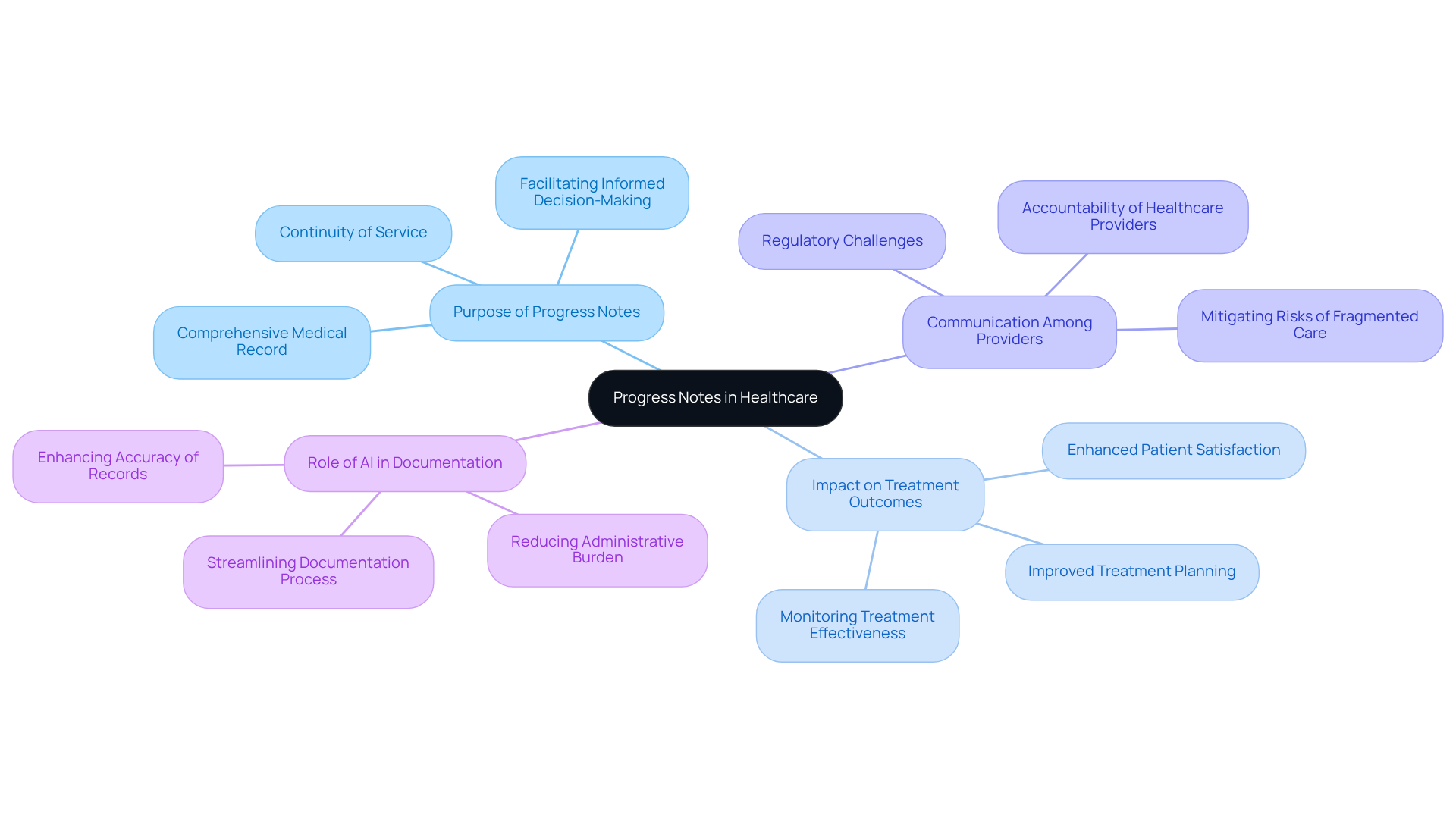
Trace the Evolution of Progress Notes in Patient Care
The journey of progress records in healthcare has its roots in ancient medical practices, where simple documentation was maintained to capture interactions with individuals. As our understanding of medicine expanded, so too did the complexity and organization of these records. By the 1970s, the introduction of standardized formats like SOAP (Subjective, Objective, Assessment, Plan) records represented a significant leap forward in documentation, providing a clear framework for healthcare providers to systematically record their interactions.
The transition to electronic health records (EHRs) transformed the way we update records, making them not only more structured but also more accessible. This technological evolution has enabled real-time updates and fostered improved communication among healthcare teams, underscoring a commitment to enhancing patient care through effective documentation practices. The historical evolution of these records emphasizes what is the purpose of progress notes in maintaining precise and thorough medical documentation, which has progressed from basic notes to advanced digital formats that support clinical decision-making and care management.
Reflecting on this journey, we remember Henry Plummer's insight from 1907, where he emphasized the significance of establishing a single, permanent health record for every individual. This pivotal moment in the organization of medical records echoes CosmaNeura's mission. Driven by a team rich in diverse healthcare expertise and robust management skills, we aim to elevate clinical experiences through effective administrative solutions and compassionate technology. Together, we can with AI-driven innovations.
As we navigate the complexities of healthcare, it’s essential to recognize the emotional burdens faced by providers. How can we lighten these burdens? By embracing solutions that streamline administrative tasks, we can focus more on what truly matters—caring for our patients. Let’s work together to enhance our documentation practices, fostering a healthcare environment where compassion and efficiency go hand in hand.
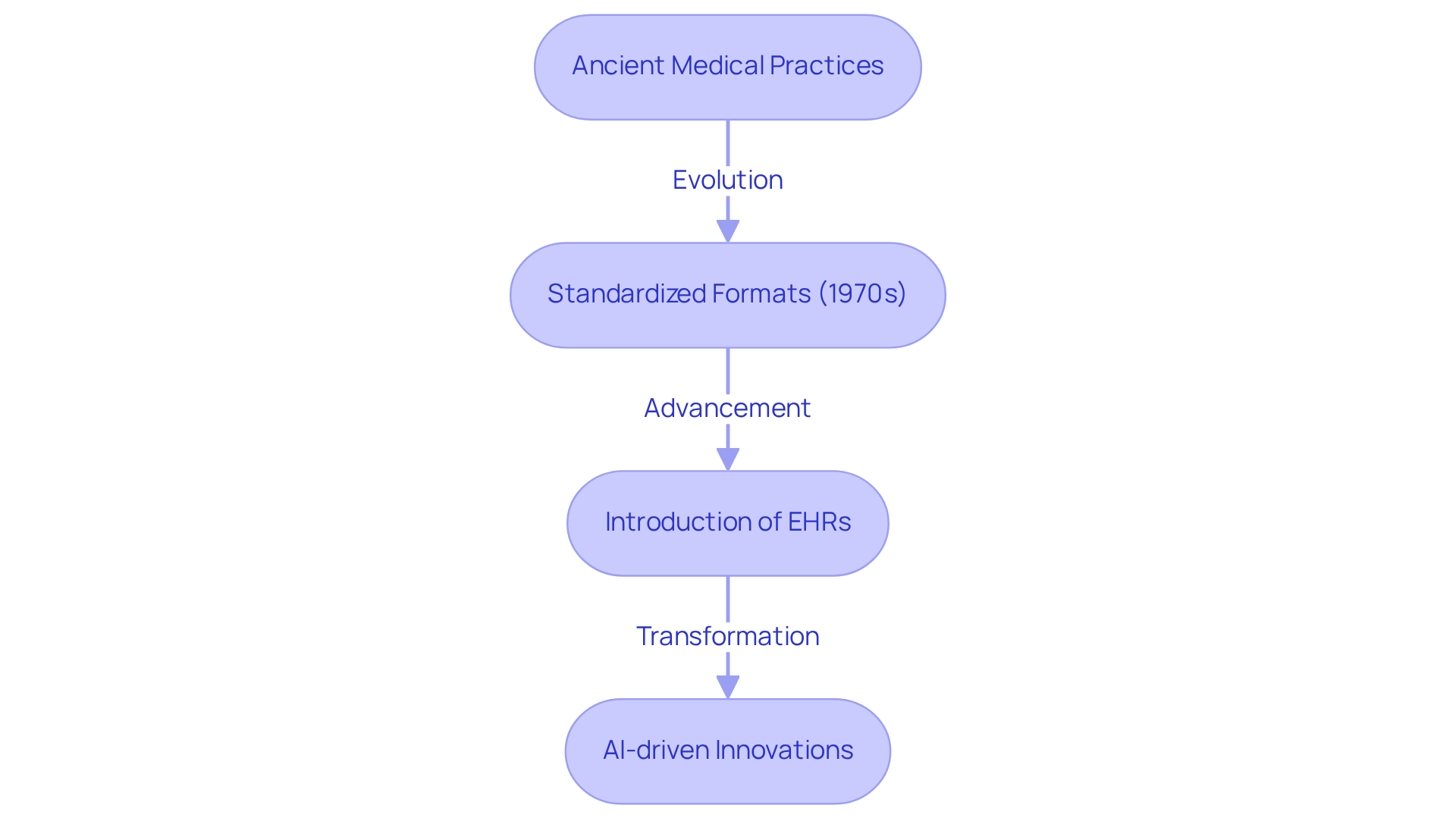
Identify Key Components of Effective Progress Notes
Efficient documentation prompts us to consider what is the purpose of progress notes, as it is vital for ensuring continuity of care and enhancing the management of individuals. Have you ever considered how the details we record can profoundly impact patient outcomes? Let’s explore the key components that make documentation effective:
- Individual Information: Essential details such as the individual's name, date of birth, and medical record number are crucial for accurate identification.
- Date and Time: Documenting when the note was written is important for tracking the individual's progress over time.
- Subjective Information: This includes the individual's reported symptoms, concerns, and relevant medical history, providing insight into their current state.
- Objective Information: Clinician observations, physical examination findings, and results from diagnostic tests contribute to a comprehensive understanding of the individual's condition.
- Assessment: This section reflects the clinician's evaluation based on the subjective and objective data, summarizing the individual's overall status.
- Plan: A detailed outline of the next steps in the individual's care, including treatments, referrals, and follow-up appointments, ensures clarity in ongoing management.
Integrating these elements not only enhances the clarity and usefulness of updates but also fosters effective communication among healthcare professionals. This ultimately leads to . Best practices suggest that clinicians should strive for clear, concise language and avoid jargon to ensure that records remain accessible and informative.
Consider this: studies show that detailed progress records raise the question, what is the purpose of progress notes, as they significantly influence management by enabling improved treatment planning and continuity of support. By embracing these documentation practices, we can alleviate some of the administrative burdens that can weigh heavily on healthcare providers, allowing them to focus more on what truly matters—their patients. Let’s commit to refining our documentation processes together, ensuring that every detail serves the purpose of enhancing care.
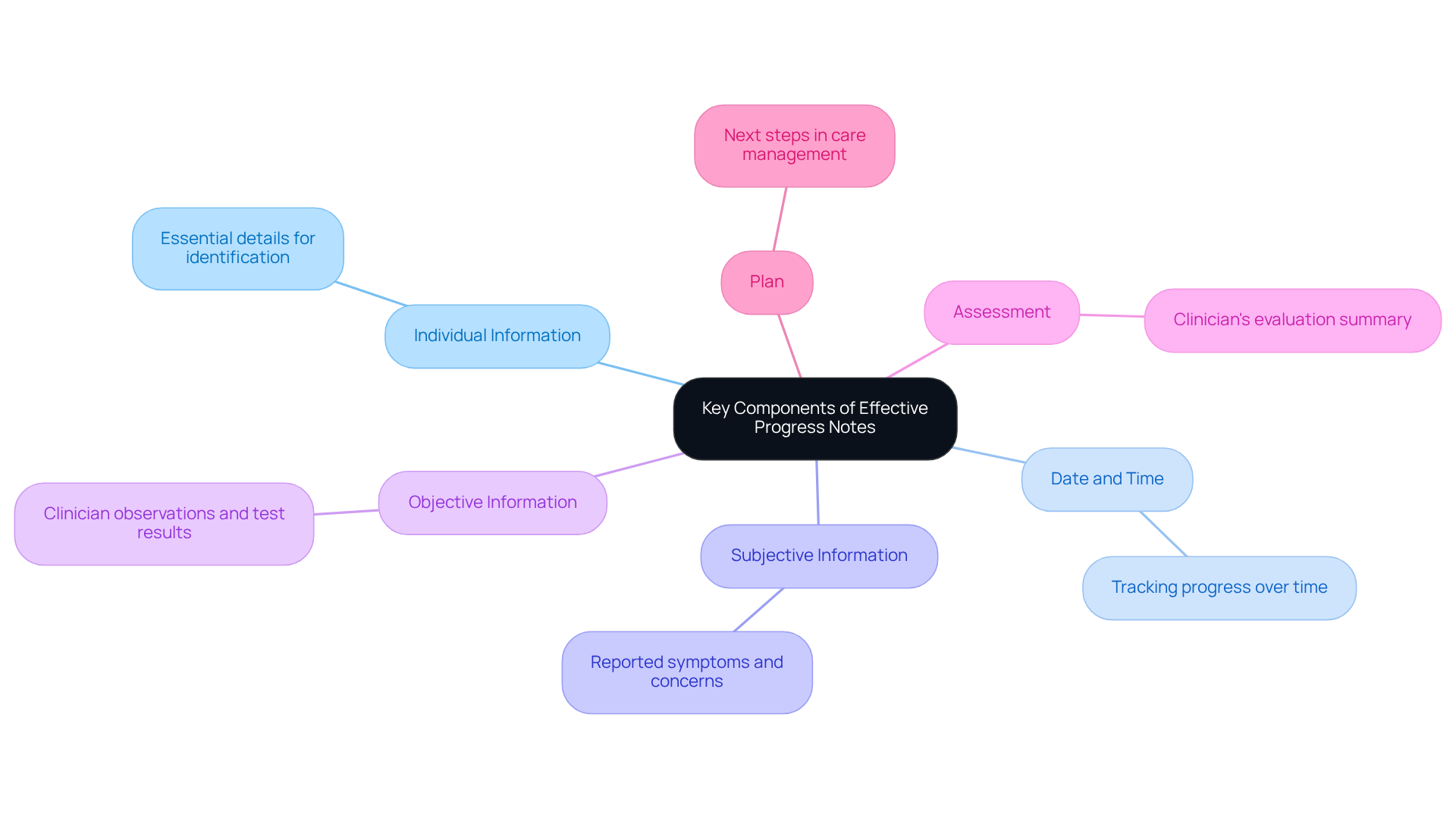
Explore the Role of Progress Notes in Enhancing Patient Care
To understand what is the , it's important to recognize their vital role in enhancing healthcare by ensuring that all members of the medical team are informed about an individual's condition and treatment strategy. Have you ever considered how effective communication among providers can lead to coordinated support and timely interventions? Studies indicate that insufficient documentation can lead to significant communication errors, jeopardizing safety and the quality of care. For instance, in 2018, a considerable amount of text was templated or copied, which often results in redundancy and errors in patient records.
Moreover, healthcare professionals face challenges such as exhaustion and a reluctance to embrace change, which can hinder the effective use of improvement records. Thoroughly recorded updates help mitigate these risks and clarify what is the purpose of progress notes as a valuable resource for quality enhancement efforts. They enable healthcare organizations to analyze trends and outcomes effectively. By fostering a culture of accountability and continuous improvement, these records contribute to a more holistic approach to wellness, ultimately enhancing safety and treatment effectiveness.
Furthermore, the integration of innovative AI solutions, like those provided by CosmaNeura's Agentic Platform, can significantly improve the quality and accuracy of progress notes. These AI-driven tools help reduce administrative burdens, streamline documentation processes, and support healthcare providers in delivering optimal care. Can you imagine how transformative this could be for the healthcare delivery landscape? Case studies showcasing the effectiveness of the Agentic Platform further highlight its potential to tackle these challenges and improve patient outcomes.
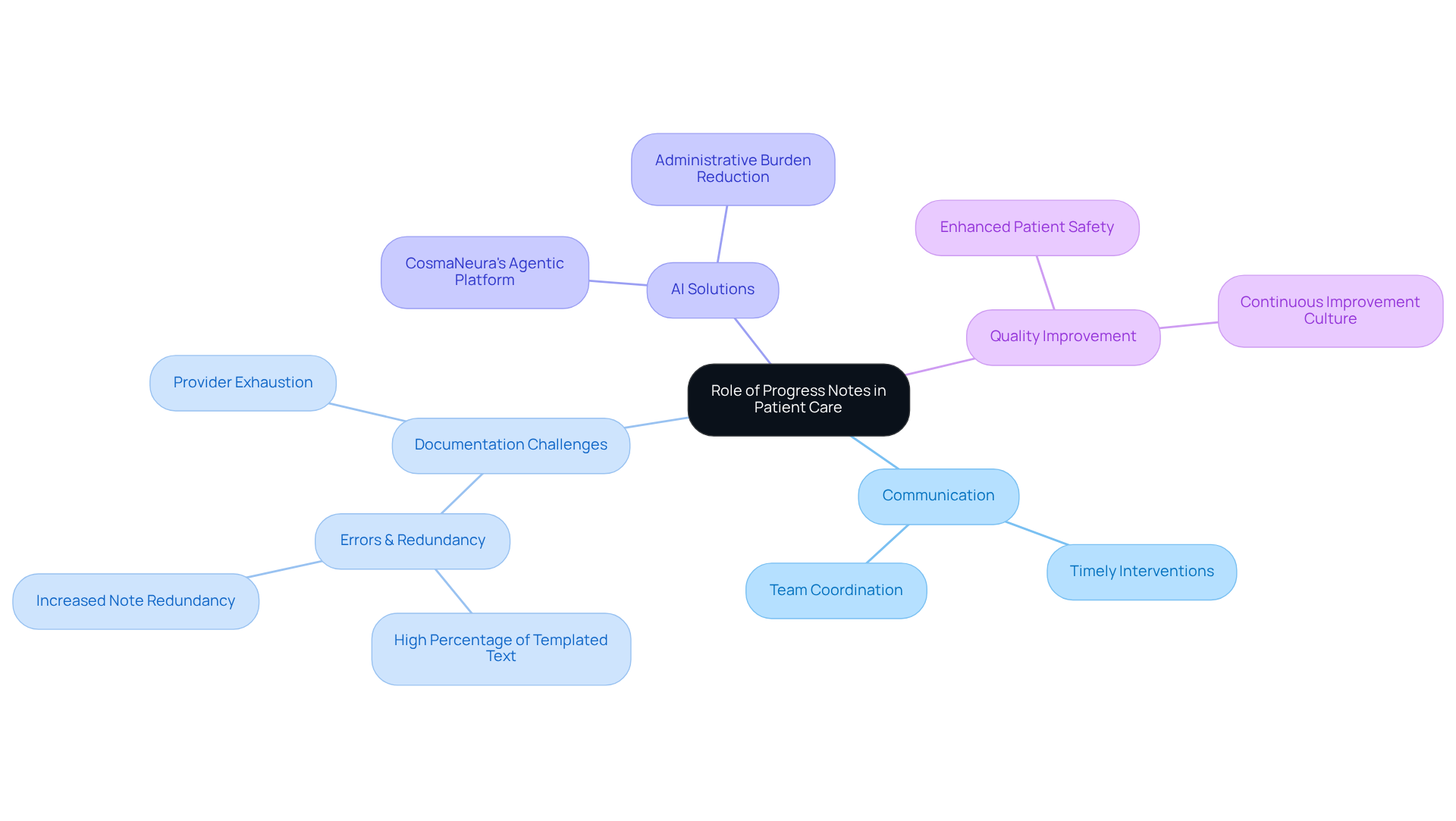
Challenges in Maintaining Accurate Progress Notes
Healthcare providers face significant challenges in understanding what is the purpose of progress notes while trying to maintain precise and effective records. Time constraints often lead to rushed documentation, resulting in incomplete or unclear notes. Have you ever felt overwhelmed by the demands of your daily responsibilities? Research indicates that doctors spend approximately 4.5 hours each day on electronic health records (EHR), which reduces direct interaction with patients and can impact the quality of documentation.
As cases grow increasingly complex, capturing all relevant information succinctly becomes even more difficult. The usability and functionality of EHR systems can vary widely, adding to the documentation burden that many healthcare providers experience. This can leave you feeling frustrated and concerned about the quality of care you provide.
To address these challenges, healthcare organizations should prioritize training on best practices for documentation. Fostering a culture that values thorough and timely record-keeping is essential. Consider implementing standardized templates and leveraging technology, such as AI-driven documentation tools. These solutions can significantly enhance the efficiency and accuracy of progress notes, which raises the question of what is the purpose of progress notes?
Ultimately, improving documentation not only eases the burden on healthcare providers but also . Together, we can create a supportive environment that prioritizes both the well-being of healthcare providers and the quality of care for patients.
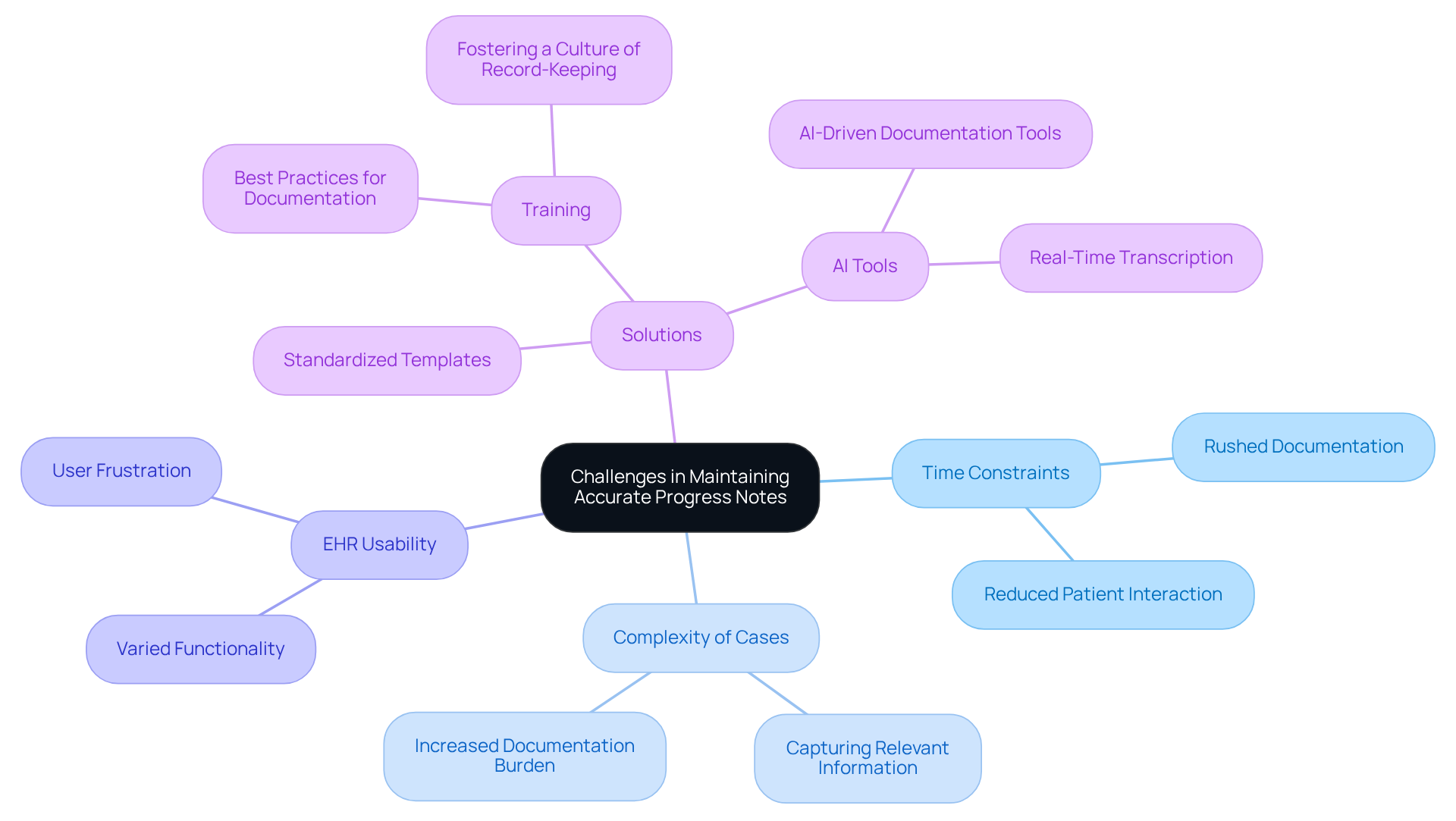
Conclusion
Recognizing the importance of progress notes in patient care highlights their essential role in fostering communication, ensuring continuity, and enhancing treatment outcomes. These records transcend mere administrative tasks; they serve as foundational elements that empower healthcare providers to make informed decisions and engage in strategic planning, ultimately leading to improved patient care.
As we delve into the significance of progress notes, we uncover vital insights about their role in documenting patient interactions. We witness the evolution from simple records to advanced electronic health systems, along with the crucial components that make documentation effective. The integration of AI solutions stands out, showcasing the potential to streamline these processes, easing the burdens on healthcare providers while enhancing the accuracy and quality of patient records.
Looking at the broader picture, it becomes evident that prioritizing effective documentation practices is crucial for the future of healthcare. By embracing innovative tools and cultivating a culture that values thorough record-keeping, healthcare organizations can enhance individual patient outcomes and elevate the overall quality of care. A commitment to refining documentation practices will pave the way for a more compassionate and efficient healthcare system, where the focus remains steadfastly on the well-being of patients. How can we, as a community, support one another in this vital endeavor?




